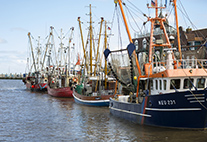5.6 Million Euros for Fish Population Forecast System
29 February 2016, by CEN Universität Hamburg

Photo: pixabay.com
CEN Scientist coordinates research project involving twenty-six European partners.
CEN Scientist coordinates research project involving twenty-six European partners.
The European Union (EU) sets annual fishing quotas in order to protect European waters and fish species from overfishing. Nevertheless, according to the EU Commission, fish stocks in the Mediterranean and the Black Sea, for instance, are critically endangered. A new European research project, headed by Prof. Dr. Myron Peck from the Center for Earth System Research and Sustainability (CEN) aims to develop a forecast system for changes in essential fish populations such as cod, herring, and sprat in the Baltic and North Seas or anchovy, sardine, and tuna in the Mediterranean and Atlantic. As the future of aquaculture will play a major role, research will also focus on mussels, oysters, salmons, giltheads, and other commercial fish.
Prof. Peck successfully applied for funding from Horizon 2020—The EU Framework Programme for Research and Innovation. The approved project called “CERES—Climate change and European aquatic RESources” will officially start in March 2016 and receive a total funding amount of 5.6 million euros. Altogether, twenty-six European research and industrial institutions will collaborate for CERES—all from the so-called Blue Growth sector, the EU’s initiative to boost sustainable growth in Europe through innovative aquaculture and fisheries strategies. The partnership network extends to institutions in Germany (Thünen Institute of Sea Fisheries), Great Britain (Centre for Environment, Fisheries and Aquaculture Science, University of Hull), Spain (Spanish National Research Council), the Netherlands (Agricultural Research Service), Romania (Danube Delta National Institute for Research and Development), and Turkey (Mersin University), among others.
Warning systems help to set fishing quotas for endangered fish species
Over the next four years, CERES researchers will strive to develop warning systems for short-term, medium-term, and long-term variations in threatened fish populations. The collected data will allow for an efficient and science-based risk management. “Such detailed information and prognoses will not only benefit fishing and fish farming industries but also policy makers responsible for fishing quotas or other fisheries measures,” explains Myron Peck.
University president Prof. Dr. Dieter Lenzen says: “I congratulate Prof. Peck on this success. Once again, Universität Hamburg proves its excellence in marine sciences and its ability to make significant research contributions to the sustainable development of our planet.”
Contact:
- Prof. Dr. Myron Peck
Universität Hamburg
Center for Earth System Research and Sustainability (CEN)
Institute for Hydrobiology and Fisheries Science
